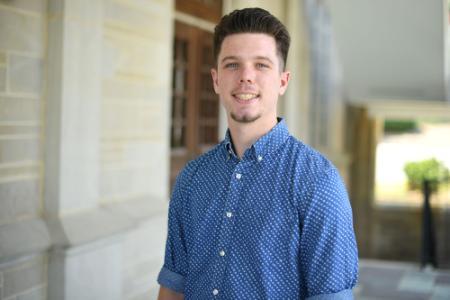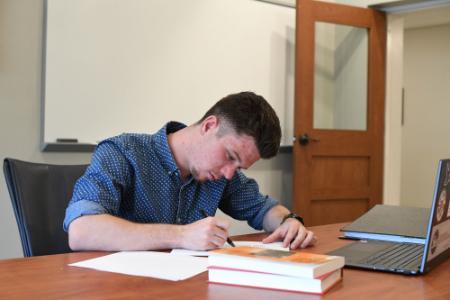Tracing the History of Mob Violence: Investigating American Political Unrest through SURI
LEXINGTON, Va. June 21, 2024 — With movements like Black Lives Matter and events of January 6, 2021, Michael “Bane” London ’25 had one question — what makes American’s gather like this to get their message across and how far back does it go?
As part of the Summer Undergraduate Research Institute (SURI) program at Virginia Military Institute, London is focusing on the ways in which a citizen or a group of citizens are trying to push a political goal, aspiration, or way of thinking on to another group. His topic, “Mob Violence in America” is being advised by Lt. Col. Mark Boonshoft, associate professor in the Department of History. 
"While this may seem to be a contemporary issue, in reality “mob” violence has been used throughout American history,” London said in his preliminary SURI research. “I will trace this history through six case studies: the Stamp Act Riots in 1765, The Whiskey Rebellion which lasted from 1791 to 1794, the Philadelphia Riots of 1844, the 1863 New York City Draft Riots, the Great Railroad Strike that occurred in 1877, and the resurgence of the Klu Klux Klan in the 1920s.”
His research will analyze when and why “mob” violence is used as a political strategy in the United States.
"Two perspectives will form the basis of my analysis, social and economic,” London said of his research. “The social perspective will investigate issues such as race, culture, and religion. An economic perspective instead analyzes issues like taxation and trade regulation. Overall, I am looking to answer why and how ‘mob’ violence is used as a political strategy in the United States, and what issues have acted as a catalyst for this type of violence.”
SURI is offered by the VMI Center for Undergraduate Research (VCUR) and provides cadets with a unique opportunity to delve into high-level research that relates to their degree path. It consists of cadet-led research under the direction of a faculty advisor.
London, a history major, is spending about 30 hours a week on research for his project this summer. His hope is to apply this research to a capstone come fall.
Growing up in rural South Carolina, London wasn’t a stranger to political change. He remembers as Confederate statues were torn down and how significant that was for his community and the country.
Participating in the SURI program enables him to work on his critical thinking skills, plus tackle a larger scale research paper with no other distractions as it would be during the normal school year.
“It's really important and it gives cadets who pursue a serious project a marketed advantage over other students,” he said.
He even surprised himself that he could take an abstract topic and dive into a well-developed thesis.
 "That sounds really kind of basic, but doing this really core academic research is something I hadn't been exposed to,” he said. “Getting that under my belt, before graduate school, before the Army I think it's a good thing.”
"That sounds really kind of basic, but doing this really core academic research is something I hadn't been exposed to,” he said. “Getting that under my belt, before graduate school, before the Army I think it's a good thing.”
As for Boonshoft, London approached him to be his advisor on the project. He wasn’t even a previous professor of his. Boonshoft taught a class in the fall of 2022 on American political violence, which covered some of what London was researching, which led London to choose him as an advisor.
"I was pretty hands-on with the proposal stage because he had this interesting idea,” Boonshoft said. “We did a lot of work to build a bibliography so that way he could hit the ground running.”
Boonshoft said the SURI program is something that is truly unique to VMI because of the way it's structured, along with the financial support it receives.
"It effectively becomes a full-time job, which is not normal, it's not common, and it does give you a leg up in whatever you want to do,” he said.
Overall, the program gives you some important life skills, Boonshoft said, like having a concept and actualizing it.
"Knowing how to start with a humongous idea and then figure out how to put guardrails around it so you can wrap your hands around it, that's a transferable skill,” he said. “Cadets’ time is precious during the semesters and there are ways you can do this. This is a way to make sure that people want to do research but for various reasons it's complicated to do during semester, can do it.”
Laura Peters Shapiro
Communications & Marketing
VIRGINIA MILITARY INSTITUTE
.svg)
.png)